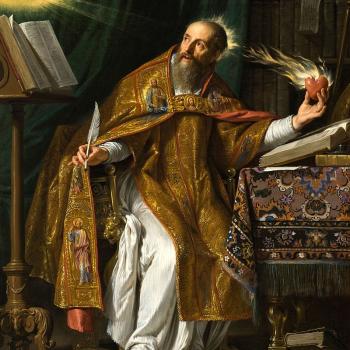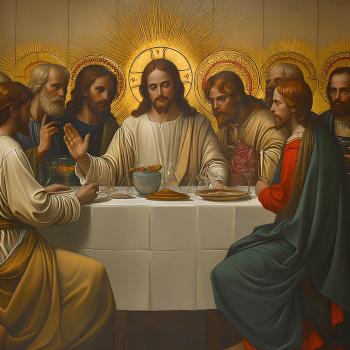For God so loved the world that he gave his only Son that whoever believes in him should not perish but have eternal life. ~ John 3:16
Last year my 10-year-old daughter asked me if we could pretend she still believed in Santa Claus. I said, "Yes! Why not?" Mind you, she knew all about the real Saint Nicholas, set up our Nativity scene with care, moved the Three Kings on their Advent journey around the living room, and added paper "hay" to an empty manger as she performed deeds of kindness and generosity (to make Jesus' bed softer and warmer). We decorated our Jesse Tree, read scriptures on her Advent calendar day by day, and lit the candles on our Advent wreath. We talked and shared and prayed our way through Advent, worshipped together on Christmas, and celebrated again on Epiphany. My little girl knew what Christmas was really about. But she asked for Santa just for the fun of it.
I think one of the big misunderstandings hidden inside the Santa controversy is the aversion that many Protestants have to the Catholic tradition of venerating saints. Catholics have always believed that all Christians, both living and dead, are members of the Communion of Saints. We believe that Christians both in heaven and on earth are connected as extended family members in the Body of Christ. Each one's acts of charity benefit that body, and our sins do it harm. We further believe, as our Protestant brethren do, in another form of connectedness, that we can ask our loved ones to pray for us—in effect, to intercede. We do not view this brotherly and sisterly intercession as in any way superseding the role of Jesus Christ as the One Intercessor before the Father. Further, we do not in any way worship those from whom we request prayers.
Through canonization, Catholics hold up (respect, venerate) the lives of certain deceased Catholics as role models of heroic virtue, the stories of their lives vibrant and varied examples of faithful Christianity. Having passed from this earthly life into eternal life, they are not considered less alive, but more so; not less concerned for the Church's mission of saving souls, but completely dedicated to it. So we "talk" to them in much the same way a Protestant would approach a very godly pastor or holy friend, and ask prayers of this heavenly Cloud of Witnesses (Heb. 12:1).
Saint Nicholas, a 4th-century bishop, is one of those absolutely phenomenal role models. Through his devotion to the poor, his kindness to children, and passionate love of that precious Baby in the manger, his life exemplifies the true spirit of Christmas. Like the family stories we proudly tell our children, the stories of St. Nicholas have been affectionately shared and honored in Catholic households for centuries.
Now for the 800-pound gorilla—that Jolly Old Elf—a pesky corruption of Saint Nicholas now appearing in shopping malls all over North America!
True confession: At the age of 7, my daughter demanded to know the truth about Saint Nick with a look that brooked no equivocation. Of course I couldn't lie. I have the humanly impossible task of teaching her about God in a world that mocks the idea, and she can't see Him any more than she can see Santa. So I watched her break down and cry as I told her that Saint Nicholas was real and living in heaven, but the chubby fellow in the red suit was just me and Daddy pretending for her enjoyment. The truth was necessary, I consoled myself, but I was filled with self-doubt as I watched her suffer.
For my generation, realizing the truth about Santa was gradual and painless. There was no breach of trust, no shattering of illusions. At some point, we were delightedly "in" on the secret and started helping our younger siblings enjoy the fantasy. Having received, we were now givers. Lots of things caused lots of people to lose their faith back then, but Santa wasn't even a contender.
I'd like to posit that the reason Santa was harmless for us was because most Catholic families were regular churchgoers, and genuine faith was on parade in every Catholic parish—every single Sunday. Our parents got down on their knees before God and their faith made demands on them, so they worked hard and made sacrifices. And you know what? They were pretty happy.
But church attendance is way down and kids are barraged with media, often provided by their parents, which plunders their innocence with diabolical efficiency while indoctrinating them into a consumerist mentality. And then un-churched parents with their undefended children bring in Santa, with his bag of stuff from the mall. He demands nothing of them. He invites them to greed and self-absorption. He becomes a big, fat liability.
So, do I think we should teach our children about Santa? Only if you're really, really sure you're putting Jesus front and center every single day. Because there are potential benefits.





